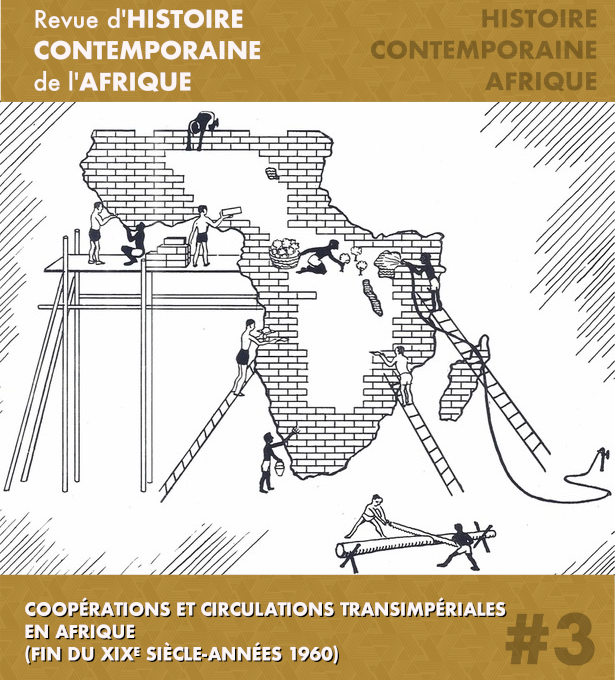Mwami Musinga et la sauvegarde de la frontière de la Kagera entre le Rwanda et le Tanganyika
Le tournant transimpérial après la Première Guerre mondiale
DOI :
https://doi.org/10.51185/journals/rhca.2022.0309Mots-clés :
tournant transimpérial, frontière, mwami Musinga, Rwanda, mandat de la Société des NationsRésumé
Après la Première Guerre mondiale, les autorités belges et britanniques ont partagé l’Afrique orientale allemande. Le tracé de la frontière entre le Rwanda et le Tanganyika a d’abord été un échange asymétrique, les Britanniques ayant réclamé de vastes portions du territoire rwandais afin de pouvoir réaliser le projet impérial du « Cap au Caire ». Cependant, il est vite apparu que, dans le cadre d’un nouvel ordre mondial, cela ne pouvait pas rester une affaire bilatérale. Le Rwanda et son roi, les ordres missionnaires au Rwanda, l’administration coloniale belge et la référence explicite aux principes de la Société des Nations ont en effet rendu possible la renégociation de ce qui semblait initialement être un accord anglo-belge de fait accompli. Le « tournant transimpérial » qui a caractérisé les années suivant la Première Guerre mondiale a ainsi facilité l’interaction entre un large éventail d’acteurs, permis une transformation de l’ordre impérial et donné la possibilité de surmonter dans une certaine mesure les logiques impériales.
Références
Arianoff A[lexandre] d’ (1952), Histoire des Bagesera : Souverains du Gisaka, Bruxelles, Institut royal colonial belge.
Belga, « Paul Kagame : “Le génocide avait commencé lors de la colonisation belge” », RTBF info, 17 novembre 2015. En ligne, consulté le 3 juin 2021. URL : https://www.rtbf.be/info/monde/detail_paulkagame-le-genocide-avait-commence-lors-de-la-colonisation-belge?id=9138781.
Ben-Nun Gilad (2019), « Territorial Conquest: Its Prevalence, Demise, and Resurfacing: 1880s – The Present », Connections : A Journal for Historians and Area Specialists, 23 mars 2019. En ligne, consulté le 3 juin 2021. URL: https://www.connections.clio-online.net/article/id/artikel-4741.
Botte Roger (1985), « Rwanda and Burundi, 1889-1930: Chronology of a Slow Assassination, Part 1 », The International Journal of African Historical Studies, 18(1), pp. 53-91.
Burbank Jane et Frederick Cooper (2011), Empires in World History: Power and the Politics of Difference, Princeton, Princeton University Press.
Castryck Geert (2015), « The Belgian Base at Kigoma’s Railhead (1920s-1930s): Territorial Ambivalence in an Inland Indian Ocean Port », Comparativ | Zeitschrift für Globalgeschichte und vergleichende Gesellschaftsforschung, 25(4), pp. 70-86.
Castryck Geert (2019), « Colonialism and Post-Colonial Studies: Introduction », in M. Middell (dir.), The Routledge Handbook of Transregional Studies, Abingdon, Routledge, pp. 91-94.
Castryck Geert (2020), « Reinventing International Colonialism during a Crisis of Empire: Belgian-British Colonial Exchanges between Inter-Imperialism and Inter-Colonial Technical Cooperation, 1920s-1930s », The Journal of Imperial and Commonwealth History, 48(5), pp. 846-865.
Chrétien Jean-Pierre (1972). « La révolte de Ndungutse (1912) : Forces traditionnelles et pression coloniale au Rwanda allemand », Revue française d’histoire d’outre-mer, 59(217), pp. 645-680.
Chrétien Jean-Pierre et Kabanda Marcel (2013), Rwanda. Racisme et génocide : L’idéologie hamitique, Paris, Belin.
Des Forges Alison L. (2011), Defeat is the Only Bad News: Rwanda Under Musinga, 1896-1931, Madison, University of Wisconsin Press.
Digre Brian (1992), « Imperialism’s New Clothes: The Mandate System in Tropical Africa, 1918-1919 », Proceedings of the Meeting of the French Colonial Historical Society, 15, pp. 211-219.
Espagne Michel (2013), « La notion de transfert culturel », Revue Sciences/Lettres, 1. En ligne, consulté le 3 juin 2021. URL : http://journals.openedition.org/rsl/219.
Fox H. Wilson (1920), « The Cape-to-Cairo Railway and Train Ferries », The Geographical Journal, 55(2), pp. 73-101.
Graditzky Thomas (2018), « The Military Occupation of German East Africa as Part of Belgian Colonialism: International Law Principles and Beyond », Journal of Belgian History, XLVIII(1-2), pp. 112-133.
Hedinger Daniel et Heé Nadin (2018), «Transimperial History – Connectivity, Cooperation and Competition », Journal of Modern European History, 16(4), pp. 429-452.
Kalibwami Justin (1991), Le catholicisme et la société rwandaise : 1900-1962, Paris, Présence africaine.
Kennedy Paul (1987), The Rise and Fall of the Great Powers: Economic Change and Military Conflict from 1500 to 2000, New York, Vintage Books.
« Länderschacher », Deutsche Allgemeine Zeitung, 20 juillet 1919. En ligne, consulté le 3 juin 2021. URL : https://zefys.staatsbibliothek-berlin.de/kalender/auswahl/date/1919-07-20/2807323X.
Manela Erez (2007), The Wilsonian Moment: Self-Determination and the International Origins of Anticolonial Nationalism, New York, Oxford University Press.
Mathys Gillian (2014), « People on the Move: Frontiers,Borders,Mobility and History in the Lake Kivu Region 19th-20th century », thèse de doctorat, Université de Gand.
Newbury Catherine (1988), The Cohesion of Oppression: Clientship and Ethnicity in Rwanda, 1860-1960, New York, Columbia University Press.
Newbury David et Catharine Newbury (2000), « Bringing the Peasants Back In: Agrarian Themes in the Construction and Corrosion of Statist Historiography in Rwanda », The American Historical Review, 105(3), pp. 832-877.
Paul Axel T. (2020), « Colonizing Colonizers: On the Colonial Transformation of “Pre-Colonial” Rwanda », Comparativ | Zeitschrift für Globalgeschichte und vergleichende Gesellschaftsforschung, 30(3/4), pp. 353-371.
Revel Jacques (dir.) (1996), Jeux d’échelles : La micro-analyse à l’expérience, Paris, Gallimard/Le Seuil.
Rutayisire Paul (2009), « Le remodelage de l’espace culturel rwandais par l’Église et la colonisation », Revue d’Histoire de la Shoah, 190(1), pp. 83-103.
Sharpe Alfred (1918), « The Backbone of Africa », The Geographical Journal, 52(3), pp. 141-154.
Sunseri Thaddeus (2018), « The African Rinderpest Panzootic, 1888-1897 », Oxford Research Encyclopedia African History. En ligne, consulté le 3 juin 2021. URL : https://doi.org/10.1093/acrefore/9780190277734.013.375.
Uvin Peter (2001), « Reading the Rwandan Genocide », International Studies Review, 3(3), pp. 75-99.
Vanderlinden Jacques (1994), Pierre Ryckmans 1891-1959 : Coloniser dans l’honneur, Bruxelles, De Boeck Université.
Vansina Jan (1994), Living with Africa, Madison, University of Wisconsin Press.
Vansina Jan (2001), Le Rwanda ancien : le royaume nyiginya, Paris, Karthala.
Vervust Petra (2010), « The Limits of Colonial Symbolic Power: Ethnicization and Racialization in Rwanda, 1890-1960 », thèse de doctorat, Université de Gand.
Téléchargements
Publiée
Comment citer
Numéro
Rubrique
Licence
Certains droits réservés 2022 Geert Castryck

Ce travail est disponible sous licence Creative Commons Attribution - Pas d’Utilisation Commerciale 4.0 International.





